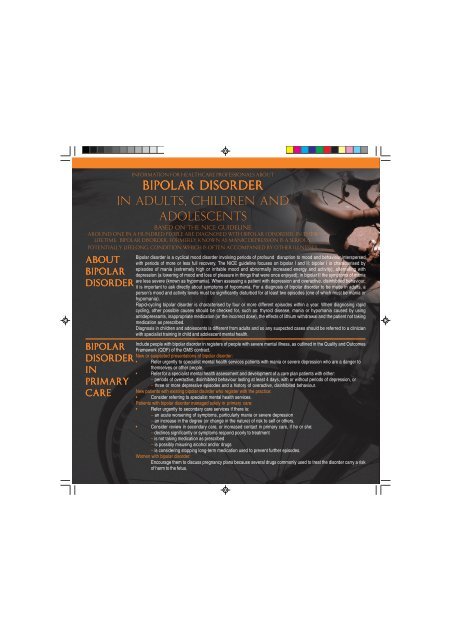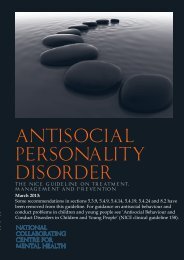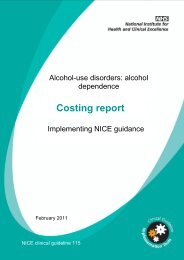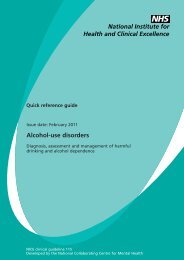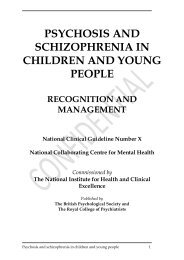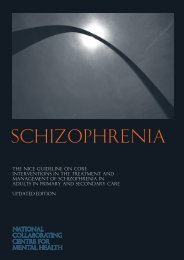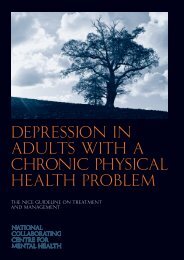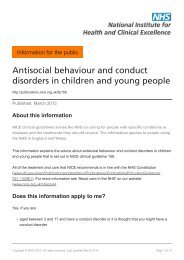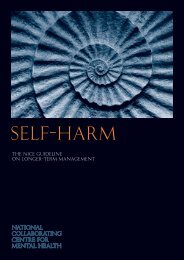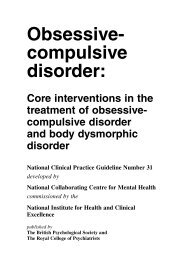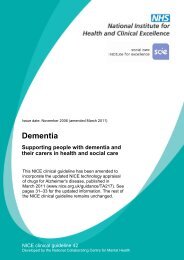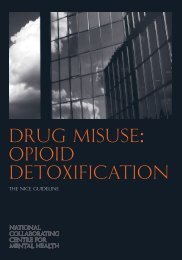NCCMH bipolar leaflet.pdf - National Collaborating Centre for ...
NCCMH bipolar leaflet.pdf - National Collaborating Centre for ...
NCCMH bipolar leaflet.pdf - National Collaborating Centre for ...
Create successful ePaper yourself
Turn your PDF publications into a flip-book with our unique Google optimized e-Paper software.
In<strong>for</strong>mation <strong>for</strong> healthcare professionals aboutBIPOLAR DISORDERIN ADULTS, CHILDREN ANDADOLESCENTSbased on the NICE guidelineAround one in a hundred people are diagnosed with <strong>bipolar</strong> I disorder, in theirlifetime. Bipolar disorder, <strong>for</strong>merly known as manic depression is a serious,potentially lifelong, condition which is often accompanied by other illnesses.About<strong>bipolar</strong>disorderBipolardisorderinprimarycareBipolar disorder is a cyclical mood disorder involving periods of profound disruption to mood and behaviour interspersedwith periods of more or less full recovery. The NICE guideline focuses on <strong>bipolar</strong> I and II: <strong>bipolar</strong> I is characterised byepisodes of mania (extremely high or irritable mood and abnormally increased energy and activity), alternating withdepression (a lowering of mood and loss of pleasure in things that were once enjoyed); in <strong>bipolar</strong> II the symptoms of maniaare less severe (known as hypomania). When assessing a patient with depression and overactive, disinhibited behaviour,it is important to ask directly about symptoms of hypomania. For a diagnosis of <strong>bipolar</strong> disorder to be made in adults, aperson’s mood and activity levels must be significantly disturbed <strong>for</strong> at least two episodes (one of which must be mania orhypomania).Rapid-cycling <strong>bipolar</strong> disorder is characterised by four or more different episodes within a year. When diagnosing rapidcycling, other possible causes should be checked <strong>for</strong>, such as: thyroid disease, mania or hypomania caused by usingantidepressants, inappropriate medication (or the incorrect dose), the effects of lithium withdrawal and the patient not takingmedication as prescribed.Diagnosis in children and adolescents is different from adults and so any suspected cases should be referred to a clinicianwith specialist training in child and adolescent mental health.Include people with <strong>bipolar</strong> disorder in registers of people with severe mental illness, as outlined in the Quality and OutcomesFramework (QOF) of the GMS contract.New or suspected presentations of <strong>bipolar</strong> disorder:• Refer urgently to specialist mental health services patients with mania or severe depression who are a danger tothemselves or other people.• Refer <strong>for</strong> a specialist mental health assessment and development of a care plan patients with either:– periods of overactive, disinhibited behaviour lasting at least 4 days, with or without periods of depression, or– three or more depressive episodes and a history of overactive, disinhibited behaviour.New patients with existing <strong>bipolar</strong> disorder who register with the practice:• Consider referring to specialist mental health services.Patients with <strong>bipolar</strong> disorder managed solely in primary care:• Refer urgently to secondary care services if there is:– an acute worsening of symptoms, particularly mania or severe depression– an increase in the degree (or change in the nature) of risk to self or others.• Consider review in secondary care, or increased contact in primary care, if he or she:– declines significantly or symptoms respond poorly to treatment– is not taking medication as prescribed– is possibly misusing alcohol and/or drugs– is considering stopping long-term medication used to prevent further episodes.Women with <strong>bipolar</strong> disorder:Encourage them to discuss pregnancy plans because several drugs commonly used to treat the disorder carry a riskof harm to the fetus.
Self-management / psychoeducationIn addition to appropriate medication and, where suitable, psychological therapies (see the NICE quick reference guide), advisepatients about:• self-monitoring of symptoms, including looking out <strong>for</strong> triggers and early warning signs• maintaining a sensible lifestyle, including a good sleep routine and work patterns• coping strategies• ways to monitor their physical health.Where appropriate, advise patients with depressive symptoms about techniques such as:• structured exercise programmes• activity scheduling• engaging in both pleasurable and goal-directed activities• ensuring adequate diet and sleep• seeking appropriate social support.In<strong>for</strong>m patients, families and carers about self-help groups and encourage them to take part because they provide in<strong>for</strong>mation on earlywarning signs, treatment and side effects, and offer support.Physical health of people with <strong>bipolar</strong> disorderPeople with <strong>bipolar</strong> disorder have higher levels of physical illness and mortality than the general population. Physical healthchecks should be carried out as soon as practicable after initial presentation and on an annual basis as outlined in the QOF.Specific monitoring is required <strong>for</strong> many of the drugs used to treat <strong>bipolar</strong> disorder, particularly <strong>for</strong> weight gain. (There is aschedule <strong>for</strong> physical monitoring in the NICE quick reference guide.)accessing the nice guideline on <strong>bipolar</strong> disorderThe evidence-based NICE guideline on <strong>bipolar</strong> disorder is available as a quick reference guide <strong>for</strong> professionals. There isalso a full guideline with details of the evidence and a booklet <strong>for</strong> patients and carers. All can be downloaded <strong>for</strong> free fromwww.nice.org.uk/cg038 or ordered on 0870 1555 455 (quoting N1076 <strong>for</strong> the quick reference guide or N1077 <strong>for</strong> the patientbooklet). To purchase a hard copy of the full guideline and find out about activities relating to the <strong>bipolar</strong> guideline contact BethShackleton at bshackleton@cru.rcpsych.ac.uk or on 0207 977 6673. Implementation tools to support the guideline areavailable at www.nice.org.uk/cg038.MDF The BiPolar Organisation is a user-led charity working to enable people affected by <strong>bipolar</strong> disorder to take control oftheir lives. It provides a range of services <strong>for</strong> people affected by <strong>bipolar</strong>, including a national network of self-help groups andself-management training programmes. More in<strong>for</strong>mation can be found at www.mdf.org.uk or by phoning 08456 340 540(UK only). Registered Charity No. 293340.NATIONALThis <strong>leaflet</strong> was written by the <strong>National</strong> <strong>Collaborating</strong> <strong>Centre</strong> <strong>for</strong> Mental Health (<strong>NCCMH</strong>) in partnership with MDF The BiPolarOrganisation. The <strong>NCCMH</strong> is funded by NICE to develop mental health clinical guidelines on its behalf. It is a joint partnershipCOLLABORATINGbetween the Royal College of Psychiatrists and the British Psychological Society. More details can be found at www.nccmh.org.ukCENTRE FORMENTAL HEALTHPublished by:the <strong>National</strong> collaborating centre <strong>for</strong> mental health The Royal College of PsychiatristsResearch and Training Unit, Standon House, 4th Floor, 21 Mansell Street, London E1 8AA • Tel.: 0207 977 6673 • Registered Charity No. 228636


